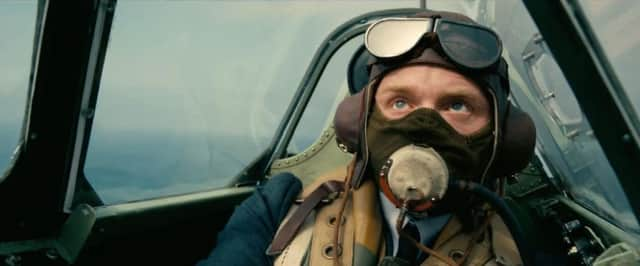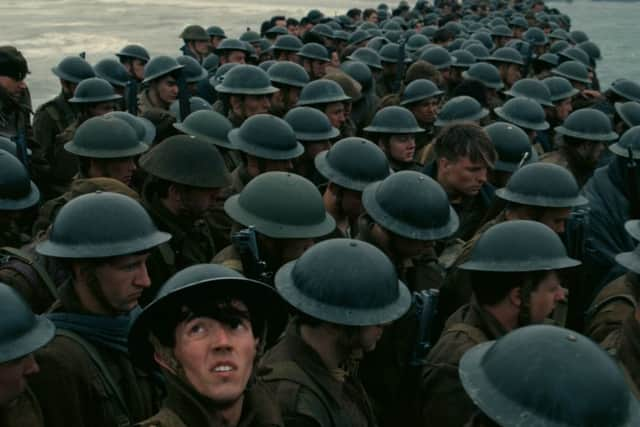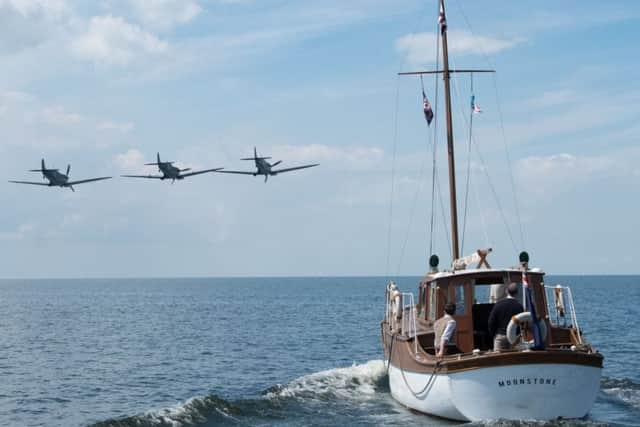Dunkirk - the epic story of Britain's greatest escape


These are exactly what you expect in a landmark film epic about Britain’s greatest military disaster since the Somme, but this is no ordinary war movie.
Dunkirk is worlds away from hugely successful but “John Wayne”-stye World War Two films like Saving Private Ryan or Pearl Harbor, and instead delivers something stunningly, chillingly different - the sensation that you are actually “there”.
Advertisement
Hide AdAdvertisement
Hide AdChristopher Nolan’s masterpiece is possibly best seen in Imax, where the Nazi fighter planes seem to be soaring literally overhead, but in fact the film is also completely devastating on an ordinary cinema screen.


The cinematography is never less than exceptional, but it is the artistry which weaves together snatches of experience from men seemingly chosen randomly from among the 400,000 soldiers trying to escape that makes Dunkirk unique.
Unlike, say, the famous 70’s movie A Bridge Too Far, there is no catalogue of international A-list stars to hold the plot together through a series of sharply-drawn cameos.
There are one or two famous faces there, notably Kenneth Branagh, but when the action does focus on individuals they come across as completely believable “ordinary people”.
Advertisement
Hide AdAdvertisement
Hide AdThere is heroism, and not just from the military, but there is also chaos, panic, savagery ... the full range of emotions and reactions from people facing death or hideous injury.


Sometimes, apart from all the explosive warfare, there is a quietly subtle touch carrying deep emotional impact – like the article we see has been published in local newspaper The Weymouth Herald towards the end of the film.
By contrast, when the action takes you airborne, inside the cockpit of a Spitfire, you are suddenly in the driving seat of a duel to the death with the Luftwaffe.
Relief is a natural reaction when the enemy pilot loses the dogfight, terminally, because had he not hundreds of men herded together in a giant queue on the jetty known as the Mole would have been butchered seconds later.
Advertisement
Hide AdAdvertisement
Hide AdThese same men unanimously cheer the RAF man as his enemy dies – had any of us been with them we surely would have too.


The soundtrack by Hans (“Gladiator”, “Interstellar”) Zimmer is a persistent, threatening undercurrent of surging menace, which chimes seamlessly with the hectic on-screen action.
When a somehow familiar refrain finally rises above the maelstrom of engine noise and air-delivered violence it initially recalls some electronic anthem by Vangelis - it’s an adaptation of the classic “Nimrod” from Elgar’s Enigma Variations.
This golden moment heralds that arguably most British and heroic moment of the Second World War.
Advertisement
Hide AdAdvertisement
Hide AdThe little ships - a volunteer civilian armada of south coast pleasure yachts and fishing smacks – have arrived.


They are tiny but many, and some are crewed by men old enough to be pensioners - and by mere boys.
They will thwart Hitler’s infernal legions by playing a major part in the successful evacuation of 338,000 men from the jaws of hell. Churchill had expected just one tenth of that number to make it.
One of these men, when told by a soldier he’s a civilian and should turn around and go home, says - absolutely dead pan – “If we allow a slaughter on the beach there won’t be a ‘home’”.
Advertisement
Hide AdAdvertisement
Hide AdMany consider that had the British army been annihalated at Dunkirk Britain would have found it nigh impossible to carry on the fight, but we’ll never know for sure.
Instead there followed the defeat of the Luftwaffe in the Battle of Britain, Rommel’s rout in North Africa, the entry of the USA after Pearl Harbor and the conquest of Sicily and Italy.
Then the Allies staged the biggest amphibious invasion in history on the Normandy beaches, and in less than a year - with the Russians pulverising the Wehrmacht in the East - had reduced the Nazis’ perverted empire of murder to ashes.
Some reviewers didn’t like the film, arguing there should have been more detail to the back stories of individuals singled out for special focus.
Advertisement
Hide AdAdvertisement
Hide AdOthers complained the role of the French was underplayed, and that there was no mention of the the heroic 51st Highland Division - the rearguard left to face the Nazi panzers.
But they miss the point, because this isn’t a documentary trying to delineate every aspect of the campaign.
It’s a white-knuckle journey through a nightmare some of us have heard about from fathers or grand-dads who were there, without really beginning to comprehend what was involved.
One man who shares the almost universal acclaim for the movie is Dunkirk veteran Ken Sturdy, who - aged 98 - attended the film premiere.
Advertisement
Hide AdAdvertisement
Hide AdFor him the film was completely real, like a video of his own experience.
You’ll find a clip of what he thought about the movie on Youtube.
It is a poignant and eloquent statement about the fate of mainly young men caught up in a gigantic, murderous struggle for survival - and about the bleak, agonising futility of war.